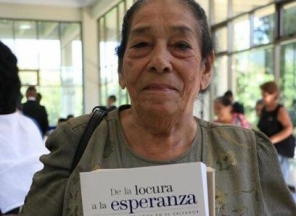
Just days before the twenty-ninth anniversary of the Jesuit massacre case, a new development provides hope for justice for the six Jesuit priests, their housekeeper and her daughter, murdered by the Salvadoran military in San Salvador in 1989.
Their murders in the early hours of November 16, 1989, at the priests’ residence on the Central American University (UCA) campus, took place as the Salvadoran government unleashed a campaign to fight off a guerilla offensive. The Jesuits were known for their efforts in denouncing repression and promoting a negotiated end to the war. However, the government at that time saw them as part of the enemy; thus, in the context of the guerilla offensive, they decided to silence them. An elite, U.S.-trained military unit, the Atlacatl Battalion, also responsible for the El Mozote massacre, was ordered to kill them, along with all witnesses, and then cover up the assassination. The killings shocked the world and drew more international attention to the situation of the country, which subsequently led to the signing of the Peace Accords in 1992.
In an unprecedented development that was just announced, the government of El Salvador has requested that the Secretary General of the United Nations grant access to the archives of the Truth Commission in relation to the Jesuit case. This progress was made possible by UCA litigation on the case through the use of the Access to Information Law. In its final report in March of 1993, the Truth Commission for El Salvador attributed the intellectual authorship of the massacre to the highest members of the civil and military hierarchy: then-President Alfredo Cristiani and the ex-Minister of Defense, Rafael Humberto Larios. Consequently, the Truth Commission recommended a complete and impartial investigation.
The Truth Commission was established through an agreement signed on April 27, 1991, in Mexico City by representatives of the Salvadoran Government and the FMLN. The agreement was incorporated into the Chapultepec Peace Accords that were finalized and signed on January 16, 1992. The Commission’s primary role was to investigate “serious acts of violence” that had occurred since El Salvador’s civil war began in 1980, a conflict that resulted in an estimated 75,000 civilians dead and thousands more missing or disappeared.
March 15, 2018, marked 25 years since the release of the Truth Commission’s historic report. Whether for judicial purposes or the purposes of historical memory, Salvadorian and international experts have reiterated how important this occasion is for the United Nations to ensure access to the Truth Commission archives. The formal petition with respect to the Jesuit case provides that opportunity.
Criminal investigations
Family members and members of the UCA Jesuit community have been searching for official recognition of truth and justice for years. Given that the Jesuits were Spanish citizens and the crime is considered a crime against humanity, they have sought an investigation of those most responsible for the crime in both El Salvador and in Spain. In 2000, a case was filed in the domestic court system of El Salvador (later closed based on a statute of limitations argument) and in 2008 a case was filed in Spain.
In the United States, the U.S. Supreme Court upheld a judicial decision to grant a request by the Spanish government to extradite Colonel Inocente Orlando Montano to Spain to be tried for the murders of the six priests in El Salvador. Between 1989 and 1992, Montano served as El Salvador’s Vice Minister of Public Security under President Cristiani. He had been living in the United States from the early 2000s until his arrest in 2012. He was tried for immigration fraud and perjury. On November 29, 2017 Montano arrived in Madrid, where he is currently detained while his trial gets underway in Spain.
Since the reversal of the 1993 Amnesty Law over two years ago, lawyers at the UCA have been demanding that Salvadoran officials bring additional collaborators and intellectual authors of the murder to trial. In November 2017, UCA representatives requested that the 2000 case be reopened. On April 16, 2018, the judge in charge reopened the case against high-ranking former military officers.
The Jesuit case, along with the 1981 El Mozote massacre case, is one of the most high-profile human rights cases that has been brought since the Amnesty Law was overturned. However, it remains to be seen when, or if, the Attorney General’s office, which is responsible for presenting new charges and evidence, will take up the case.
Defense lawyers for the military officers have simultaneously filed an appeal and requested that a judge of the Court recuse himself. The criminal chamber of the Supreme Court should rule on the recusal request in the coming days.
Despite the complicated political uncertainties surrounding this case, the Spanish process and the petition to open the Truth Commission archives as part of the domestic court process are all extremely important steps for human rights and the rule of law. While it would be best if this trial advances in El Salvador, holding the trial in Spain may bring a measure of justice and international pressure that could contribute to ongoing domestic prosecutions.





